NFT Team Ownership: Revolutionising Sports Fandom and Engagement
Updated On: October 21, 2025 by Aaron Connolly
NFT Team Ownership Explained
NFT team ownership lets fans collectively buy and control shares of esports teams through blockchain-based digital tokens. Teams issue fractional ownership tokens, and fans pick them up, gaining voting rights on team decisions and maybe even a cut of prize winnings or sponsorships.
What Is NFT Team Ownership?
NFT team ownership flips the traditional sports ownership model on its head using blockchain technology. Instead of a single wealthy owner calling all the shots, teams create digital tokens that represent ownership shares.
Each token gives holders certain rights. Maybe you get to vote on roster changes, have a say in merchandise designs, or decide which tournaments the team enters.
Token holders become something more than just supporters—they’re mini-owners.
Ownership structures aren’t all the same. Some teams offer governance tokens just for decision-making. Others hand out profit-sharing tokens, so holders get a slice of prize money and sponsorship revenue.
Blockchain technology keeps voting transparent and profit distribution automatic. Smart contracts handle payments and voting results, so team management doesn’t need to step in.
How NFT Team Ownership Works
Teams create ownership tokens on blockchain networks like Ethereum or Polygon. The total supply of tokens adds up to 100% ownership, and each token is a fraction of that.
Fans buy tokens during initial offerings or later on secondary markets. Token prices go up and down, depending on how the team performs and what the market thinks.
Here’s a rough outline of the process:
• Token Creation: Teams mint a set number of ownership tokens
• Initial Sale: Fans buy tokens straight from the team
• Governance Access: Token holders get voting rights on team decisions
• Profit Distribution: Smart contracts share revenue automatically
• Trading: Fans buy and sell tokens on crypto exchanges
Most teams set a minimum number of tokens for voting rights. This helps keep spam voting in check.
The blockchain keeps every transaction and vote on record, visible to anyone. Fans can check their ownership and see how the team splits up money in real-time.
Benefits for Fans and Investors
Token ownership lets fans connect more deeply with their teams. Instead of just cheering from the sidelines, fans actually influence team strategy and direction.
Financial perks might include tokens going up in value and a share in revenue. If a team does well, token prices rise, and profit distributions get bigger.
Fans have seen returns in a few ways:
• Prize money from tournament wins
• Profits from sponsorship deals
• Token value increases as teams get more popular
• Access to exclusive merchandise and events
Community building gets a boost through shared ownership. Token holders often hang out in private Discords, talk strategy with coaches, and get behind-the-scenes content.
But let’s be real: token values can drop fast if the team tanks or loses sponsors. Esports organizations aren’t always financially stable, so these tokens can be risky.
Voting gives fans influence that was unheard of before. Token holders have approved roster changes, tournament schedules, and sometimes even team relocations.
Regulatory uncertainty is still a big question mark. Countries treat these tokens differently, which could affect their legal status or whether you can trade them at all.
The BIG3 Example: Pioneering NFT Team Ownership
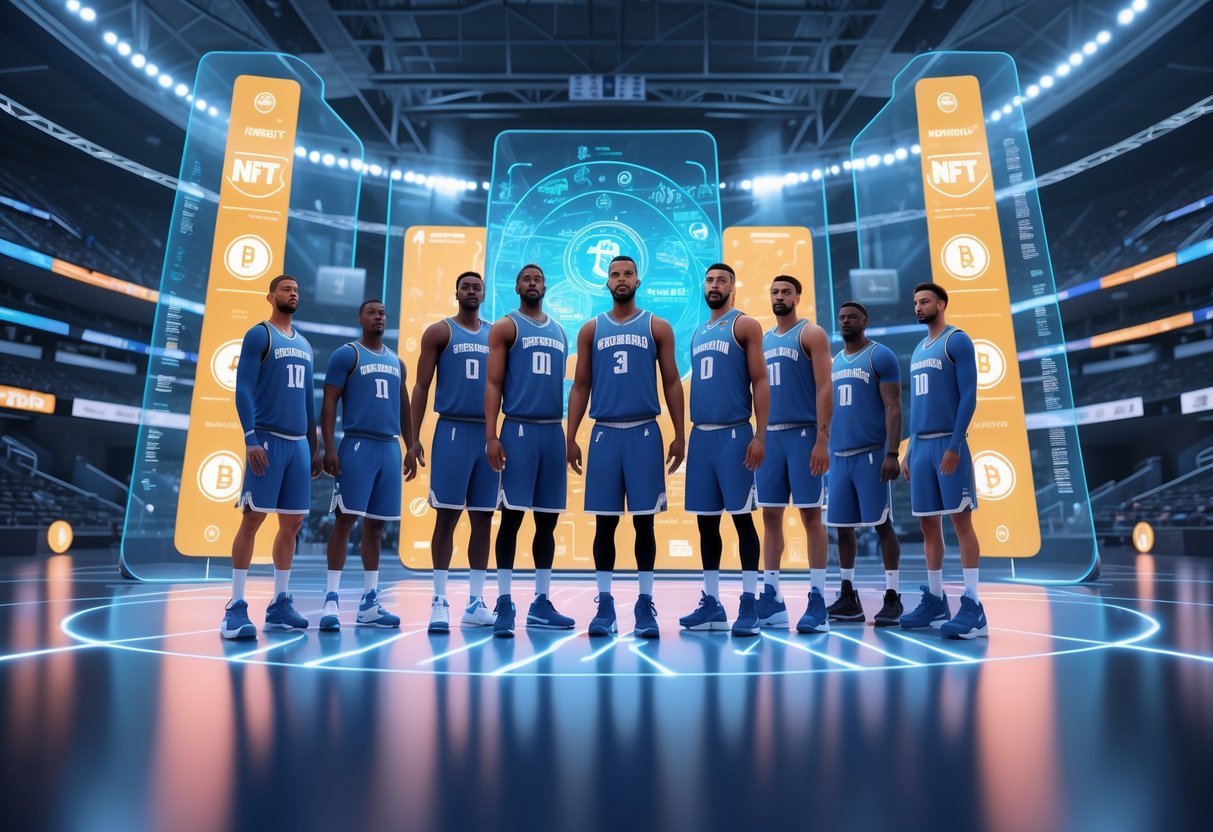
The BIG3 basketball league kicked off the first major NFT team ownership program in pro sports. Ice Cube, who co-founded the league, sold stakes in all 12 teams using blockchain tech, giving fans voting rights and special perks for £5,000-£25,000 per NFT.
Overview of BIG3 and Its Mission
BIG3 launched as a three-on-three basketball league with retired NBA stars. By its fifth season, it had become one of the fastest-growing sports properties since UFC.
The league started out owning all 12 teams itself. That centralised model made fan engagement pretty limited—just tickets and merch, really.
BIG3’s leadership saw a chance to shake things up. They wanted fans to have real stakes in teams, not just watch from the stands.
The league announced plans to raise up to $66 million through NFT sales. Each team would sell 1,000 ownership NFTs, pushing toward a decentralised ownership structure.
Team voting structure:
- Fans elect 3 owners per team
- CEO, President, and Vice President roles
- Direct say in team decisions
This approach is a big departure from the old-school way of doing things. Fans get actual power as stakeholders.
The Role of Ice Cube in BIG3
Ice Cube co-founded BIG3 alongside media executive Jeff Kwatinetz. His celebrity and business savvy drove the league’s early momentum.
Ice Cube really pushed the NFT ownership idea in interviews. He pointed out that blockchain tech made fractional ownership way more accessible than the usual investor model.
He saw NFTs as the next logical step. Instead of selling teams to rich investors, BIG3 could spread ownership across thousands of fans.
Ice Cube wanted NFT holders to actually influence team operations and league decisions—not just collect pretty pictures.
His involvement gave the project a lot of credibility. Fans trusted that Ice Cube was serious about changing how sports ownership works.
Because Ice Cube was on board, the project drew attention from mainstream sports fans who might have ignored NFTs otherwise.
BIG3 NFT Offering Structure
BIG3 set up a two-tier NFT system for each team. Every team offered exactly 1,000 ownership tokens, split between premium and standard tiers.
Fire Tier NFTs:
- 25 per team
- £25,000 each (9.3 ETH)
- Intellectual property rights
- Team merchandise licensing
- Enhanced gameday experiences
Gold Tier NFTs:
- 975 per team
- £5,000 each (1.68 ETH)
- Basic ownership rights
- Voting privileges
- VIP tickets
Both tiers gave holders voting rights on team decisions. All NFT owners got exclusive merch and priority access to games.
The Fire tier sold out fast for all 12 teams. Premium holders picked up licensing rights to create their own team-branded merchandise.
BIG3 ran sales in three phases: first to whitelisted members, then raffle winners, and finally the general public.
The league showed that fans would pay serious money for ownership perks. This proved NFT team ownership could bring in big revenue beyond just sponsorships.
How Blockchain Technology Empowers Team Ownership
Blockchain tech creates permanent records of team ownership that no one can tamper with. Fans can buy small pieces of teams, and smart code automates contracts.
Transparency and Security
Blockchain tech makes team ownership totally transparent. Every transaction is on a public ledger, open for anyone to check. Fans know exactly who owns what share of their favorite teams.
Traditional ownership hides behind piles of paperwork. With blockchain, records live on a network that thousands of computers keep running. No single person or company can quietly change the records.
The security benefits are huge for esports teams. When ownership details are on blockchain, it’s nearly impossible to fake claims. Each token has a unique digital fingerprint.
Smart security features stop common issues:
- Fake ownership docs can’t exist
- Disputes get settled by checking blockchain records
- Transfer histories stay visible forever
A lot of esports organizations are already testing blockchain ownership. The tech means fans’ ownership stakes are protected by cryptography instead of just legal agreements.
Fractionalisation of Ownership
Blockchain lets teams split ownership into thousands of small tokens. Fans don’t need millions to buy in—they can own a tiny stake for much less.
This really opens things up for regular supporters. Maybe a student grabs £50 worth of tokens in their favorite team. Hundreds of fans can own small pieces and still feel connected.
Tokens act like digital shares that fans trade with each other. If a team gets popular, token values might go up, so fans get both emotional and financial investment.
Benefits for different groups:
| Group | Advantage |
|---|---|
| Fans | Affordable team ownership |
| Teams | Raise money from supporters |
| Players | Possible token rewards for good performance |
Some esports teams are already trying out fractional ownership on blockchain platforms. Fans get voting rights and a share of revenue from tournaments, sponsorships, and merchandise.
Smart Contracts in Sport NFTs
Smart contracts run ownership rules automatically—no human middlemen needed. These digital agreements handle things like profit sharing and voting rights.
When teams win tournaments, smart contracts send prize money to token holders instantly. The blockchain figures out each person’s share and pays them right away.
Voting is easier with smart contracts. Token holders can vote on team decisions, and the system counts and implements the results automatically.
Smart contracts help with tricky stuff too:
- Performance bonuses for players get paid out fairly
- Merch revenue goes to token holders every quarter
- Sponsorships trigger royalty payments right away
This tech cuts out the middlemen. Instead of lawyers or accountants managing transfers, smart contracts make trades happen instantly when conditions are met. That saves money and speeds things up.
Ownership Tiers in NFT Sports Teams
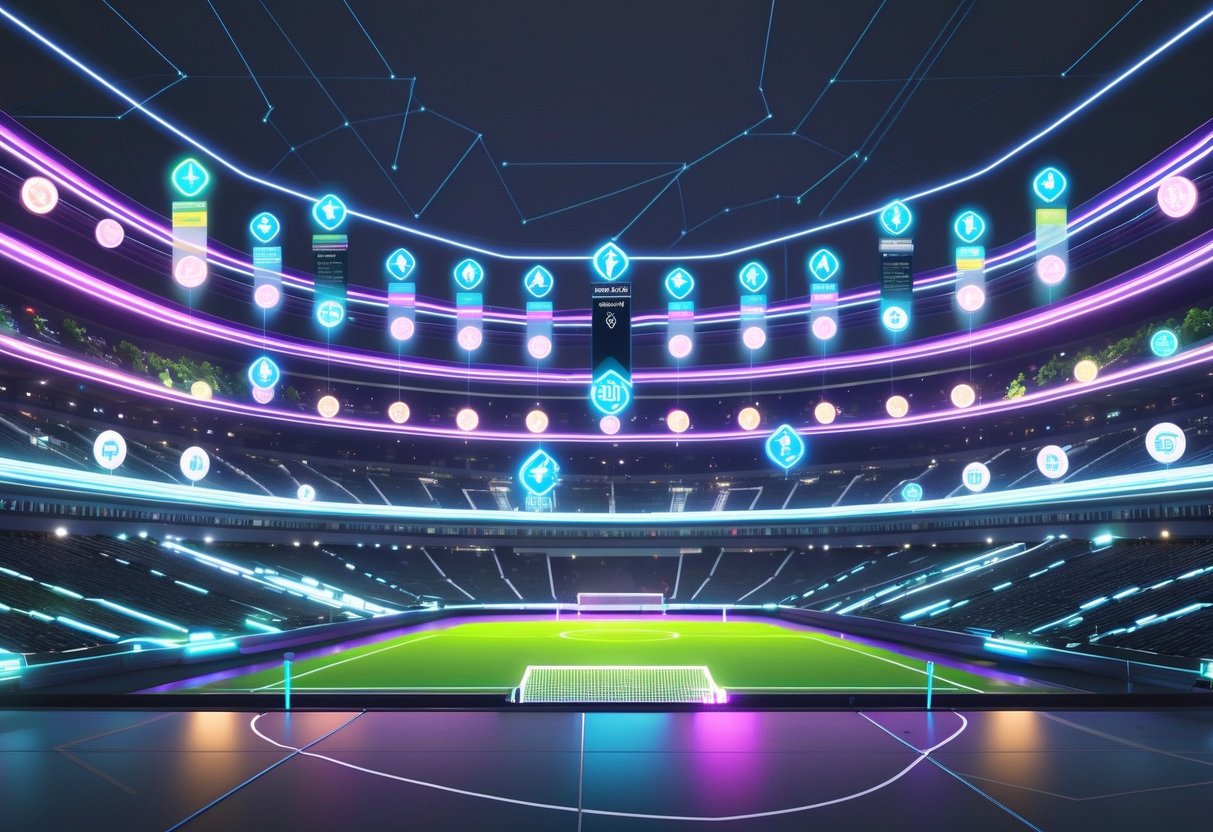
NFT sports ownership usually comes in several tiers, each with its own perks and access. The BIG3 basketball league set the standard with their Fire and Gold tier system—higher tiers get more voting rights, exclusive experiences, and a shot at financial returns from team sales.
Gold Tier vs. Fire Tier Explained
Gold tier NFTs are the entry point for most leagues. In the BIG3 setup, each team offers 975 Gold tier NFTs at £4,000 apiece. Owners get benefits like free game tickets, VIP seating, and exclusive merchandise.
Gold tier holders can attend owner parties after games. They also meet players and coaches. Some voting rights come with the package, like picking team colors for games.
Fire tier is the premium level. Each BIG3 team sells just 25 Fire tier NFTs at £20,000 each. Fire owners get all the Gold perks—and then some.
Fire tier owners can use the team’s name and logo to make and sell products. If the team gets sold, they take home 40% of net proceeds. If their team wins the championship, Fire owners get real rings alongside the players.
Eligibility and Access Levels
Gold tier is simple—buy the NFT and you’re in. These holders share voting rights with other Gold owners. They can join weekly strategy calls with coaches and players.
Fire tier owners elect three reps from their group. These become the CEO, President, and Vice President for the team. Only Fire tier holders can take these roles.
Access Level Comparison:
| Feature | Gold Tier | Fire Tier |
|---|---|---|
| Price | £4,000 | £20,000 |
| Available per team | 975 | 25 |
| Team sale proceeds | 0% | 40% |
| Executive roles | No | Yes |
| IP rights | No | Yes |
Fire tier owners get special access to practices and press conferences. They can buy extra playoff tickets before Gold holders. Some Fire perks require you to hold the NFT for a set time, which helps avoid speculation.
Rights and Utilities Offered to NFT Owners
Sports team NFTs come loaded with special perks that make them worth owning. These benefits can include exclusive event access or even unique experiences with your favorite club.
Exclusive Ticketing Perks
Priority match access is honestly one of the biggest perks for team NFT owners. Lots of clubs give guaranteed tickets to sold-out matches or playoff games before the general public even sees them.
NFT holders often get discounted season tickets or access to special seating sections. Some teams even set up VIP areas at home matches just for digital token holders.
Away match packages open up too. These usually come bundled with transport, accommodation, and match tickets at lower rates.
Ticketing perks go way beyond just football games. NFT owners usually get early access to:
- Stadium tours
- Training ground visits
- Pre-season friendlies
- Youth team matches
Some clubs run tiered systems where rare NFTs unlock better seating or bigger discounts. Rare tokens might get you an executive box, while common ones just offer a seat upgrade.
Special Access to Team Activities
Behind-the-scenes content gives NFT owners exclusive looks at training sessions, team meetings, and match prep. You won’t find this stuff anywhere else.
Many teams let fans do virtual meet-and-greets with players through private video calls or Discord. It’s a chance to ask your football heroes questions, which is pretty wild.
Training ground visits are a hit. NFT holders can watch practice and sometimes even join skills challenges with coaches.
Some clubs offer exclusive merchandise you can’t find in regular team shops—think limited-edition shirts, signed gear, or NFT-themed stuff.
Digital voting rights let token holders have a say in club decisions, like picking charity partners, retro kits, or community projects.
Teams also throw networking events where NFT owners meet other fans and sometimes even former players or club legends at private gatherings.
Exclusive Merchandise and IP Rights
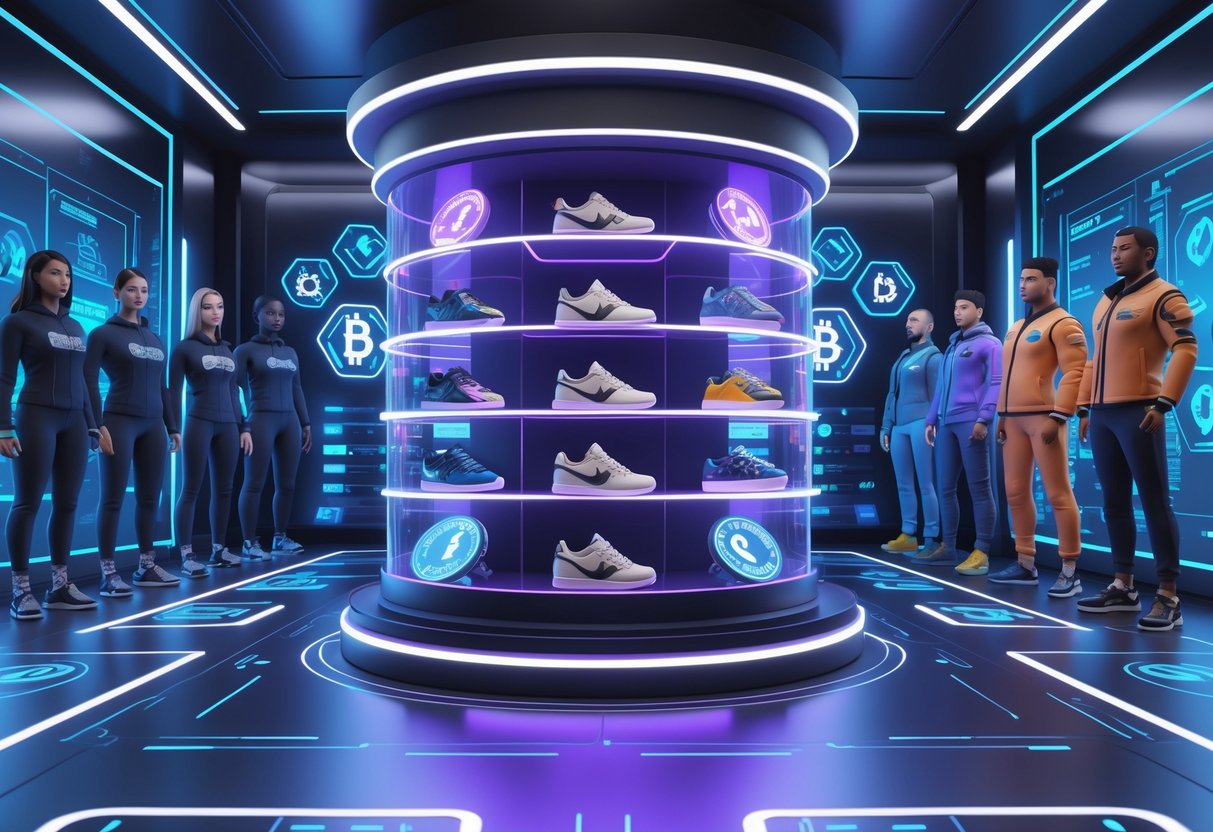
NFT team ownership usually comes with exclusive merchandise packages and sometimes valuable intellectual property rights. Some projects give holders both physical collectibles and the legal ability to monetise team branding.
Merchandise Benefits for Owners
NFT team owners typically get exclusive merch that regular fans can’t buy. This might be signed memorabilia from players, limited-edition jerseys, or custom gear with team branding.
A lot of projects keep the merchandise benefits coming through the season. In leagues like Big3, Fire-tier NFT holders receive exclusive merch all year.
Common perks:
- Signed team memorabilia
- Limited-edition clothing and accessories
- Custom items with your details
- Priority on new merch drops
- Physical collectibles tied to team wins
These items sometimes match or even beat the NFT’s original price. Some holders resell the merch to offset what they spent.
Quick tip: Always check the retail value of the promised merch before you buy any team NFT.
Intellectual Property and Monetisation Opportunities
Some NFT projects let holders use and monetise team intellectual property. That might mean logos, branding, or images for business.
Fire-tier NFTs in Big3, for example, give holders exclusive licensing rights to team IP (not including players and coaches). These rights can generate serious revenue if you get creative.
IP rights might include:
- Using team logos and branding for business
- Making and selling merchandise
- Licensing to third parties
- Sharing in IP-generated revenue
- Access to exclusive team imagery and content
Not every NFT project includes IP rights. Many just let you display the art or use it for personal stuff.
Warning: Always check which IP rights actually transfer with your NFT—terms can vary a lot.
If you do get IP rights, you can launch your own merch, license branding, or even create digital content using team assets.
Voting Rights and Decision-Making Power

NFT team ownership gives fans real voting power on team operations and big decisions. Token holders can shape everything from player transfers to merch choices, bringing a bit of fan democracy to esports.
How Voting Works for Team Operations
NFT holders get voting rights based on how many tokens they own. Every token counts as a vote on things like roster changes, coaching hires, or partnerships.
Voting usually happens on blockchain platforms. Token holders vote online, and smart contracts tally and execute the results. This way, everyone sees how decisions happen.
Typical voting topics:
- Player recruitment and releases
- Training facility choices and upgrades
- Approving sponsorships
- Picking tournaments
- Team branding and logo changes
Most teams need a certain number of votes before making big changes. Major roster moves, for instance, might need 60% of token holders to say yes.
Fans with more NFTs get more influence, sort of like shareholders in a company.
Influence on Team Sales and Public Decisions
Token holders get a real say on big decisions that shape the team’s future—stuff like team sales, league changes, or huge sponsorship deals.
When a team wants to sell, NFT holders vote on whether to approve it. This helps block unwanted takeovers and keeps fans in the loop.
Fans can influence:
- Team relocations – Moving to a new city or region
- League participation – Picking which competitions to join
- Merchandise releases – Approving new kits and products
- Charity partnerships – Choosing causes to support
- Stadium naming rights – Deciding on sponsorship deals
Voting weight can differ. Some projects give everyone the same vote, while others base it on how many NFTs you own.
Not all tokenised teams offer real voting power. Some just let you vote on things like jersey colours, not the big stuff.
Unique Experiences for NFT Owners
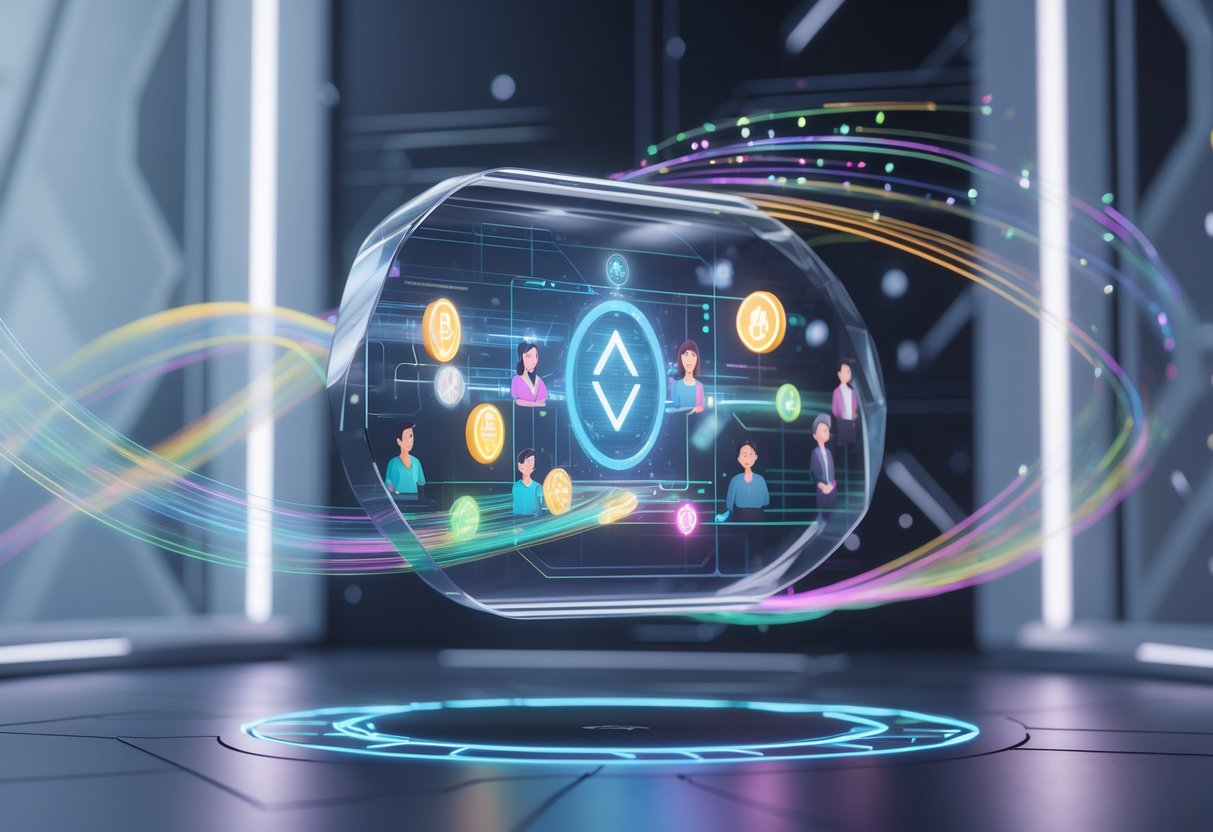
Sports teams are rolling out perks that go way beyond digital collectibles. NFT holders get into exclusive events and behind-the-scenes content that regular fans just can’t access.
Meet-and-Greets and Behind-the-Scenes Access
NFT ownership opens doors regular fans can’t walk through. Teams offer exclusive video calls with players, coaches, and managers. These aren’t massive fan events—they’re small, direct Q&A sessions.
Behind-the-scenes access becomes part of the match day. NFT holders get special footage from training, locker room speeches, and pre-match prep. Clubs even send weekly exclusive content straight to your digital wallet.
Virtual stadium tours happen all season. You can check out the players’ tunnel, trophy rooms, and executive boxes through high-quality video. Teams sometimes bring in former players or club legends for live commentary.
Player interviews for NFT communities happen monthly. These chats dive into personal stories, training routines, and unfiltered opinions you won’t hear on TV.
VIP Events and Championship Celebrations
Championship celebrations turn into private digital parties for NFT holders. Teams throw online events where token owners from all over the world celebrate together.
NFT ownership unlocks special match experiences. Some clubs invite you to premium viewing parties at partner venues or exclusive stadium areas. Your NFT is your ticket.
Award ceremonies get extra coverage for token holders. You can watch uncut footage of speeches, reactions, and backstage moments the TV cameras miss.
Season ticket holder events now go digital for NFT communities. Teams organise exclusive merch drops, early kit launches, and special discounts. That NFT membership really brings financial perks all year.
Community Engagement through NFTs
NFT team ownership builds communities where fans connect through official Discord servers and direct team interactions. These digital assets work as membership passes, unlocking exclusive experiences and bringing supporters closer to the organisation.
Joining Official Discord Channels
Most NFT sports projects come with access to exclusive Discord servers. You’ll need to verify NFT ownership to get in, so these are premium fan communities.
Discord servers usually have several channels. General chat rooms for match talk and strategy. Announcement channels for team news or upcoming drops. Some even have voice channels for live match commentary.
Popular Discord features:
- Real-time Q&As with players
- Early access to merch releases
- Exclusive voting on team decisions
- Member-only competitions and giveaways
Teams often run weekly Discord events. The Australian Open’s NFT project, for example, built a 10,500-member Discord and sold out their Art Ball NFTs in just three hours.
Interaction with Teams and Other Owners
NFT ownership lets fans, players, and management connect directly through verified channels. Teams use this feedback to build stronger supporter relationships.
Common ways to interact:
- Monthly video calls with coaches
- Private social media groups
- Meet-and-greets at venues
- Input on merch designs
Secondary markets let NFT holders trade and connect with other fans. Most of this happens in Discord servers, where people share trading tips and discuss prices.
Some projects offer more if you own a rare NFT. Rare token holders might get access to player phone numbers or private training sessions. Standard NFTs usually just get you community access and voting rights.
Limitations and Considerations
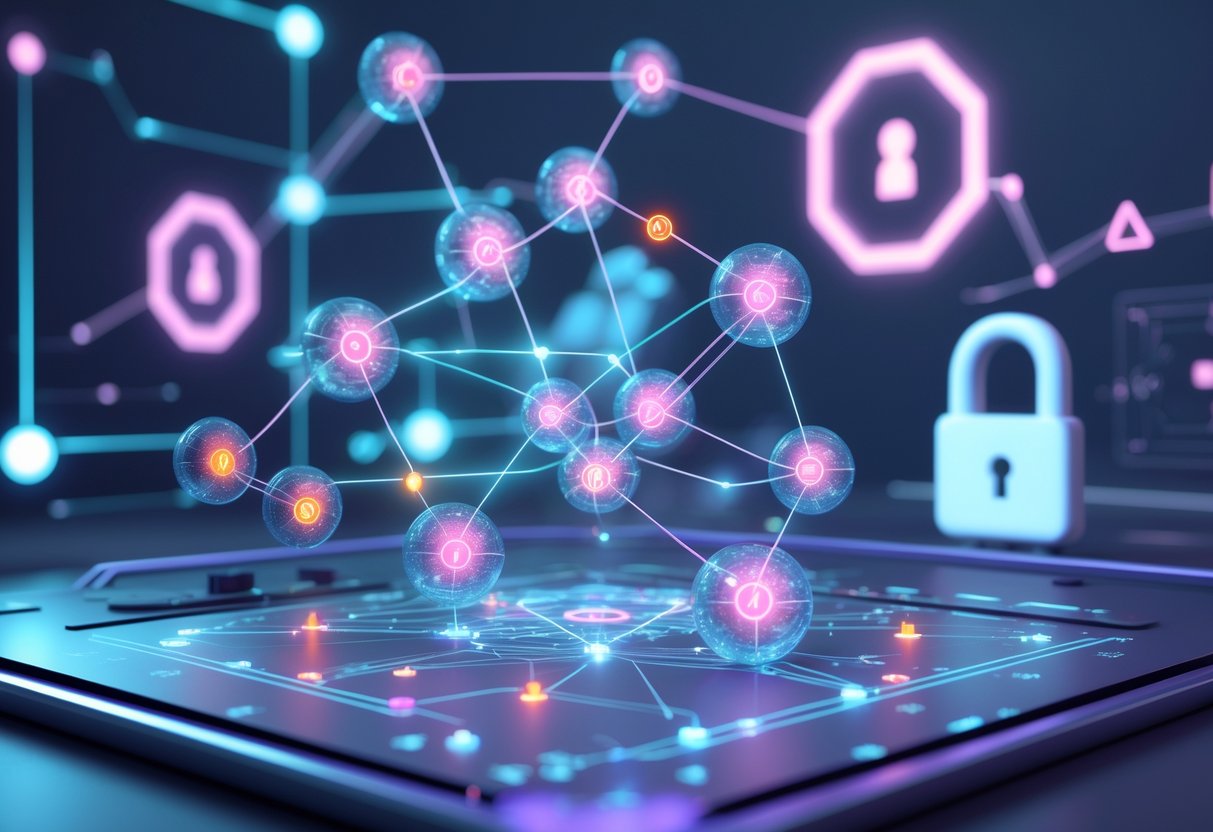
NFT team ownership comes with some big legal and financial limitations that fans should know about. The technology looks like an investment, but it doesn’t have the same protections or ownership rights as traditional sports investments.
Distinction Between True Equity and Fan-Based Ownership
NFT team ownership is nothing like actually owning equity in a sports organisation. When you buy team NFTs, you’re really just getting digital tokens that represent fan engagement—not legal ownership.
Traditional equity gives shareholders voting rights, profit shares, and asset claims. NFT holders usually get none of that. The intellectual property stays with the team or whoever created the NFT.
Most team NFT projects just grant limited licensing rights. Maybe you can use team images as your avatar or access special content. But you can’t commercialise the assets or make new stuff from them unless you get explicit permission.
Key differences:
- No voting rights on actual team decisions
- No profit sharing from team revenues
- No claim to team assets if sold
- Little or no commercial usage rights
Copyright and trademark laws don’t change just because you own an NFT. Teams keep full control over their brand, intellectual property, and commercial use.
Market Risks and Resale Potential
NFT markets can swing wildly and have way less liquidity than traditional investments. Team NFTs face extra risks tied to team performance and how fans feel.
Market volatility factors:
- Team performance changes demand
- Player transfers shake up values
- League changes or relegation kill interest
- Tech platform failures can wipe out everything
Selling on secondary markets isn’t always easy. Unlike famous art NFTs, team tokens appeal to smaller fan groups. That means illiquid markets where finding a buyer is tough.
Most NFT projects don’t store the digital asset on the blockchain itself. They just link to content on external servers. If those servers go down or the company folds, your NFT is basically worthless—even if the blockchain record still exists.
Warning: A lot of team NFT projects don’t have clear ways to resell or guaranteed buyers, so getting your money back isn’t a sure thing.
Regulatory uncertainty adds another layer of risk, as governments keep working out how to tax and classify NFTs.
NFT Team Ownership Beyond BIG3
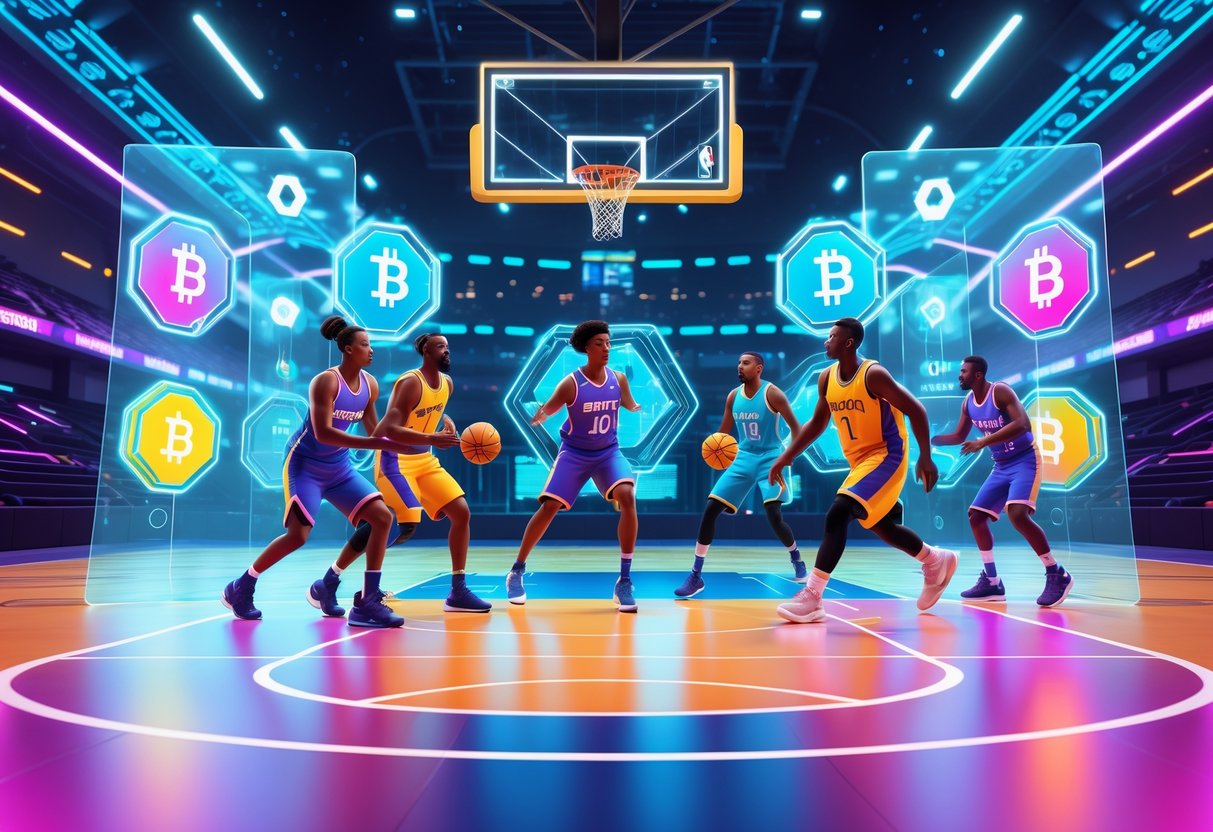
BIG3 kicked off the idea of fractional team ownership with NFTs. Now, other leagues are poking around at similar models, and honestly, this tech might totally change how fans connect with pro sports.
Other Leagues Adopting NFT Ownership
A few esports organizations have started playing with NFT-based ownership. FaZe Clan, for example, dropped limited NFT collections that let holders vote on some team choices and snag exclusive merch.
Traditional sports leagues seem pretty interested too. The NBA has tried out fan voting using blockchain, but actual ownership? That’s still off-limits thanks to their franchise rules.
Some European football clubs rolled out fan tokens. These let supporters vote on kit designs or even training ground features, but they don’t really grant actual ownership.
Racing leagues like Formula E teamed up with blockchain platforms to offer digital collectibles with governance perks. Fans can help pick car liveries or even weigh in on driver selections through token-based voting.
Regulatory headaches kind of stall things, though. Most big leagues have strict ownership rules so fans can’t just buy teams through digital assets.
The Future of Fan Involvement in Sports
Blockchain’s probably going to move past basic collectibles and push into real fan participation. Hybrid models might pop up, mixing old-school ownership with digital fan stakes.
Smart contracts could split up revenue for NFT holders automatically. Imagine getting a cut of match-day profits, merch sales, or sponsorship money—sent straight to your wallet.
Esports is leading the way here. These orgs don’t face the same red tape as traditional sports, so they can try new ownership models without much pushback.
Virtual reality could make things even wilder. NFT holders might get to peek into team facilities, watch training sessions, or even sit in on strategy meetings through immersive digital environments.
Micro-ownership is another cool angle. Fans could buy shares in individual players, team buildings, or even specific match outcomes using fractional NFTs.
But heads up—a lot of projects overpromise. Don’t dive in without checking the legal details behind any NFT ownership deal.
Frequently Asked Questions
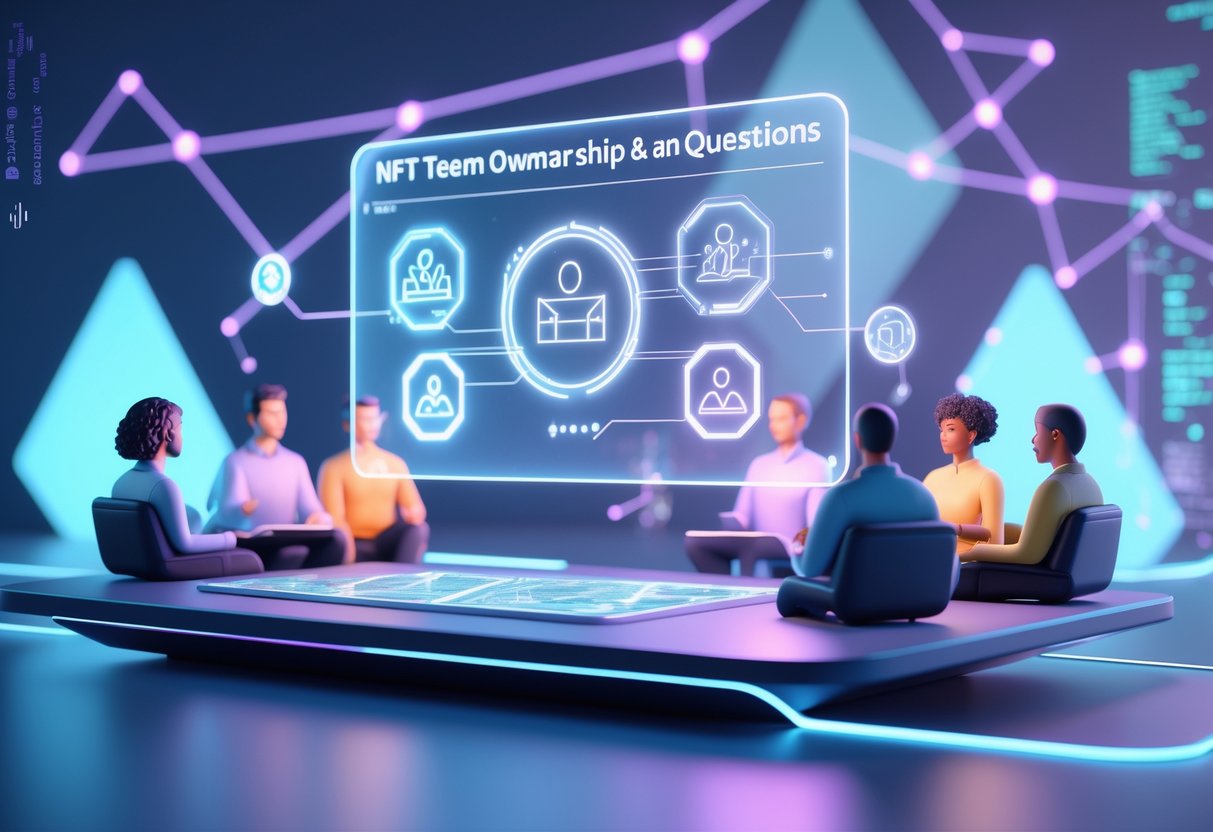
Here are some questions people usually ask about buying into NFT teams, your role as an owner, and the financial returns you might see.
How can individuals acquire ownership of an NFT team?
You can grab NFT team ownership tokens straight from the team’s official marketplace or places like OpenSea. Most teams release a limited batch during their first drop.
Always check the team’s official site first. They’ll announce token sales on social media or Discord.
If you miss the initial sale, secondary markets have tokens from current owners. Prices go up or down based on how the team’s doing and demand. Double-check the token’s authenticity on the blockchain before buying.
Some teams let you buy just a slice of ownership. Fractional tokens make it a lot more affordable to get started.
What are the steps involved in setting up an NFT-based sports team?
Starting an NFT sports team isn’t easy—it takes a bunch of legal and technical prep. You’ll want a clear business plan that lays out your revenue model and how you’ll engage fans.
First, set up your team’s legal structure. Work with lawyers who get both sports law and blockchain. They’ll help you deal with local regulations.
Next, create the NFT smart contracts that spell out ownership rights. These contracts say what owners can actually do and how profits get split. Test everything before you launch.
Try to partner with gaming orgs or sports clubs. It’ll give your team a boost and help you get into leagues faster.
Could you detail the financial benefits of owning an NFT team?
Owning part of an NFT team can pay off in a few ways. Prize money from tournaments gets split among token holders based on their share.
Sponsorships bring in more cash. Teams with big fan followings attract better sponsors, which means higher payouts for owners.
Merch sales and branded content licensing can bring in steady income. Some teams even run gaming camps or coaching for extra profits.
If your team does well, token values can climb. Just like with regular sports franchises, successful teams usually see their tokens go up in price.
What role do NFT team owners play in the management of the team?
NFT team owners usually get to vote on big decisions using blockchain-based systems. The more tokens you have, the more voting power you get.
Owners might vote on roster changes, sponsorship deals, or where to spend the budget. Some teams even let you weigh in on colors, logos, and merch designs.
Day-to-day stuff stays with the pros. Coaches run training and strategy, while business managers handle contracts and logistics.
Community calls keep owners in the loop about how the team’s doing and what decisions are coming up. Discord is where most of the conversation happens.
How are profits shared among NFT team investors?
Smart contracts handle profit sharing automatically. Your cut depends on how many tokens you own out of the total.
Most teams pay out quarterly or after big tournaments. The smart contract sends crypto right to your wallet based on your share.
Some teams keep a slice of profits to reinvest in better players, facilities, or marketing to grow the brand.
Dividend rates can be all over the place. Teams in top games like CS2 or League of Legends usually offer better returns than newer orgs.
What considerations should be taken into account before investing in an NFT team?
Dig into the team’s track record first. Check out their tournament results and player contracts, and see if they’re actually transparent about their finances.
Make sure you understand the legal side of things in your country. NFT investments might trigger tax issues or run into weird regulations you didn’t expect.
Take a close look at the esports scene for the specific game. If the game’s popularity is fading, teams often lose value fast. On the other hand, teams in growing scenes? They definitely look more promising.
Think about how much time you can actually devote. If you want to be an active owner, you’ll need to vote on stuff and keep up with team decisions and performance.
Only invest money you’re okay with losing. Esports teams can flop, and NFT prices sometimes crash hard when the market tanks.


